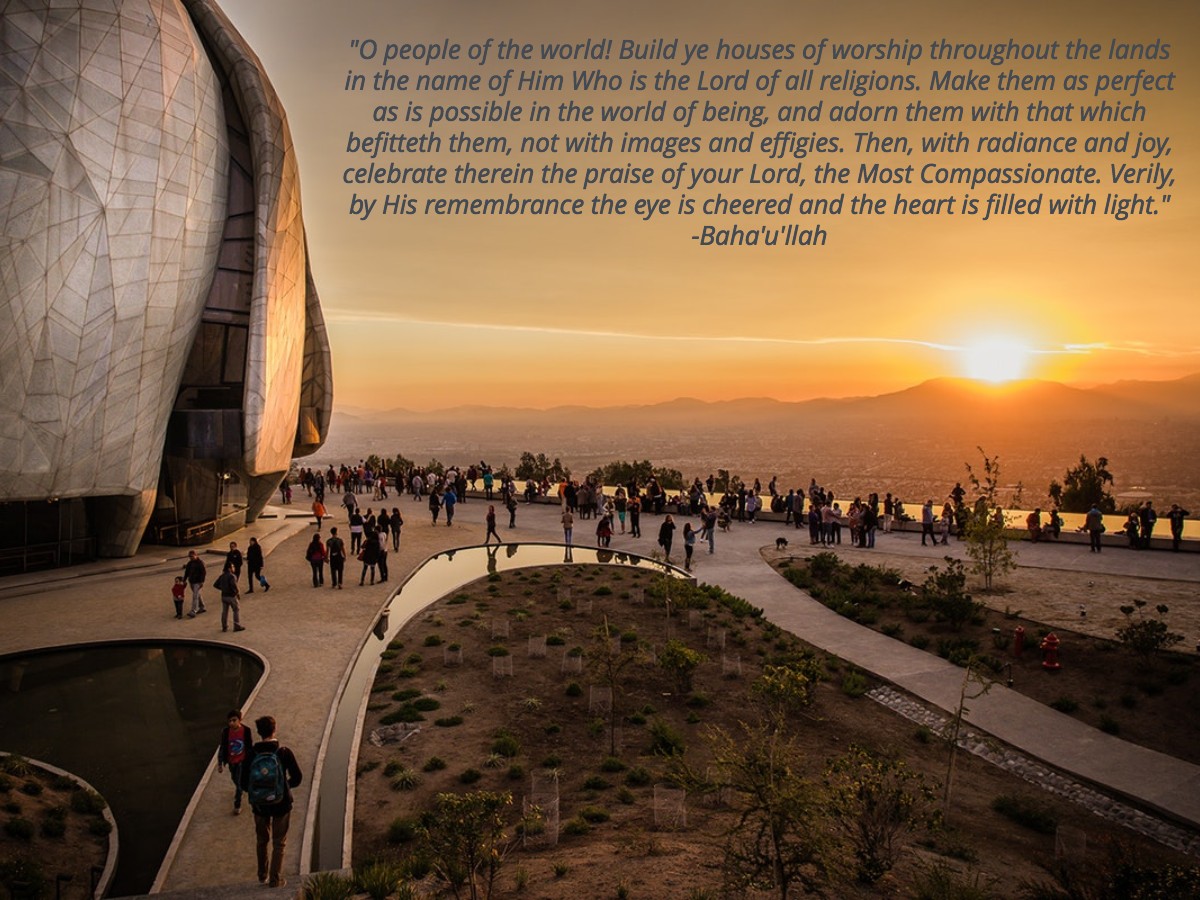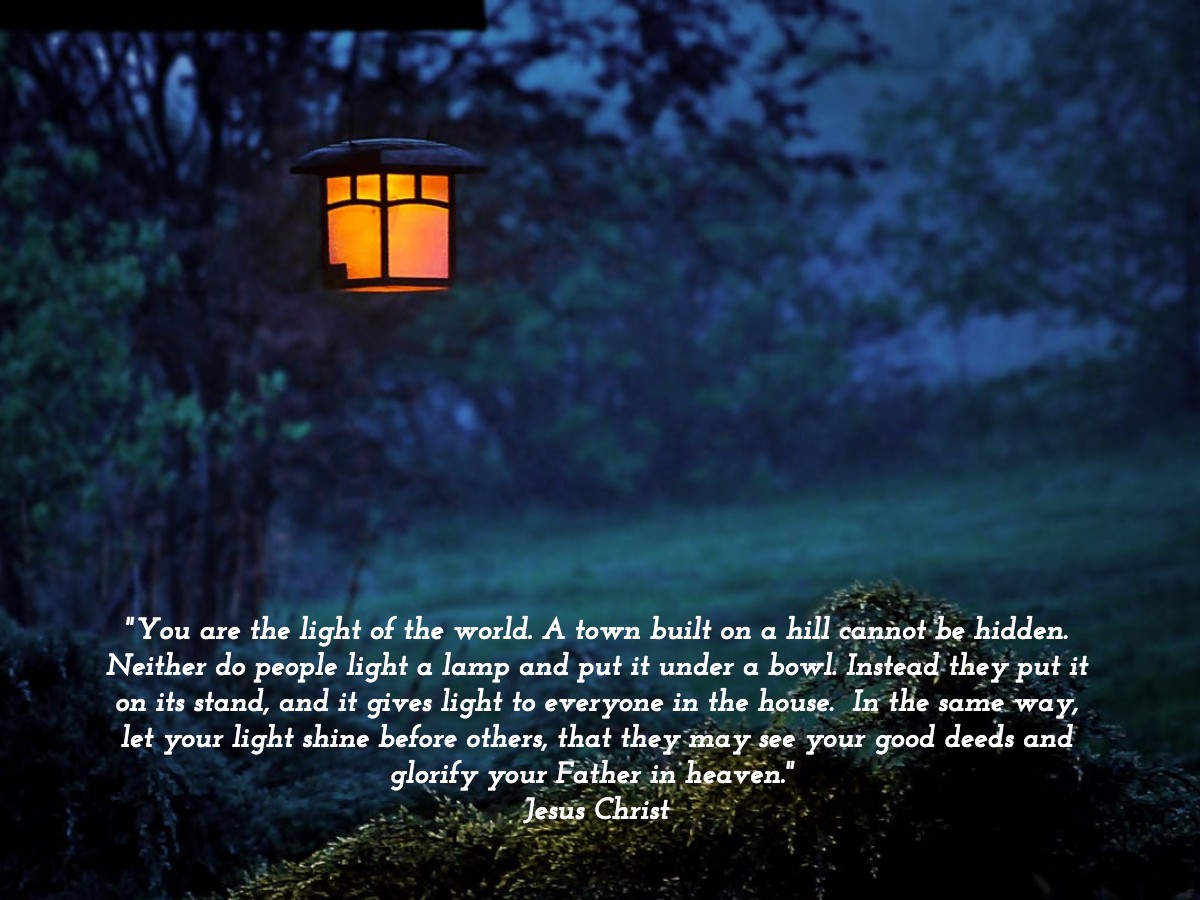This post continues as part 2 on the claims of Jesus and their relationship to Baha’u’llah’s teachings, from our series on the Gospels. In this part, we look at it from a more philosophical and theological perspective, exploring some of the terminology used in the Gospels and Baha’i Writings to explain the nature of religion.
In part 1, we discussed the passage where Jesus declares that He is the “Way, the Truth, and the Life” and “no one gets to the Father but through Him”. We discussed how an interpretation of this passage based on the truths revealed by Baha’u’llah maintains the obvious interpretation of the passage- that Christ represented God and He was the Way to God- even the exclusive way to God for that time in history- but that because Christ said He would return and Baha’u’llah claimed to be the return of Christ, Baha’u’llah’s claim is not fundamentally contradictory to the obvious meaning of the passage.
We could just stop there, but there is so much more depth to this discussion worth highlighting that it’s valuable to press on. Jesus had said He had many things to tell his followers but they “could not bear it” at that time, but the “Spirit of Truth” would come and lead us “into all Truth”. The “Spirit of Truth”, in a Baha’i understanding, is another Manifestation of God who builds on the teachings of Christ in a new age, a later time in history. For our time, that is Baha’u’llah.
A fundamental aspect of Jesus’ teaching is that He represented the “Father”– that is, God- on earth. He makes the point that “nobody has seen the Father”, and therefore Christ is needed to represent Him.
In the Revelation of Baha’u’llah, we have passages that explain this principle in greater depth than is spelled out in the Gospels. Baha’u’llah’s forerunner, his “John the Baptist”, the prophet known as the Bab, states again and again in His Tablets that the Essence of God- the “Father”- is unknowable to humans-
….There can be no doubt that from everlasting God hath been invested with the independent sovereignty of His exalted Being, and unto everlasting He will remain inaccessible in the transcendent majesty of His holy Essence. No creature hath ever recognized Him as befitteth His recognition, nor hath any created being ever praised Him as is worthy of His praise. He is exalted above every name, and is sanctified from every comparison. Through Him all things are made known, while too lofty is His reality to be known through anyone but Him.
For us, as beings created by God, our experience of our Creator is limited to the expression of God’s qualities in His creation. Just as Christ taught, we cannot know the “Father” directly- “You have not seen the Father”. It is as if we are living in a painting created by a painter, or we are a video game character created in a virtual reality. Our entire universe of experience is within the painting or the video game. We simply don’t possess the capacity to experience the Creator in a direct sense. Yet, we are of course completely dependent on the Creator at all times. The Báb expresses this concept in another passage-
God is sanctified from His servants and no direct relationship ever exists between Him and any created thing, while ye have all arisen at His bidding. Verily He is your Lord and your God, your Master and your King.
Baha’u’llah similarly expresses this fundamental concept throughout His Revelation-
To every discerning and illuminated heart it is evident that God, the unknowable Essence, the Divine Being, is immensely exalted beyond every human attribute… Far be it from His glory that human tongue should adequately recount His praise, or that human heart comprehend His fathomless mystery. He is, and hath ever been, veiled in the ancient eternity of His Essence, and will remain in His Reality everlastingly hidden from the sight of men.
Our experience of God is only that of His Will as expressed in the creation we experience. If we were living in the painting, our experience of God would be the paintbrush, which acts as the Will of the painter within the painting. The Báb called this the “Primal Will”, the paintbrush that acts within the painting.
In the Bible and Baha’u’llah’s Writings, it is also called “Word of God”, the primal Information that creates all that is- “The Word of God is the king of words and its pervasive influence is incalculable. It hath ever dominated and will continue to dominate the realm of being It is an ocean inexhaustible in riches, comprehending all things. Every thing which can be perceived is but an emanation therefrom. High, immeasurably high is this sublime station, in whose shadow moveth the essence of loftiness and splendour, wrapt in praise and adoration.”
Baha’u’llah further tells us that it is “Command of God”, that it is “spoken without any syllable or sound”, an essence that “is God’s all-pervasive grace, from which all grace doth emanate. It is an entity far removed above all that hath been and shall be. “ Everything we know is an expression of it. Nature itself “is God’s Will and is its expression in and through the contingent world. It is a dispensation of Providence ordained by the Ordainer, the All-Wise. Were anyone to affirm that it is the Will of God as manifested in the world of being, no one should question this assertion.” In other words, the “Primal Will’ of God, otherwise known as the “Word of God”, is the creative action of God in the world, and the closest we can see and understand of God from our limited perspective.
Divine revelation is the phenomenon of God expressing His Will through a human being- the Manifestations of God, bringing words and teachings that push humanity forward on our path of spiritual and social advancement. The Manifestations are the embodiment of the Divine Will. They aren’t God, but they are God to us. If God is the sun in the sky- too bright for us to look at directly- the Manifestations of God are like a perfect mirror of His light upon the earth, one that we can look at.
As Baha’u’llah further explains-
The door of the knowledge of the Ancient of Days being thus closed in the face of all beings, the Source of infinite grace…hath caused those luminous Gems of Holiness to appear out of the realm of the spirit, in the noble form of the human temple, and be made manifest unto all men, that they may impart unto the world the mysteries of the unchangeable Being, and tell of the subtleties of His imperishable Essence. These sanctified Mirrors, these Daysprings of ancient glory, are, one and all, the Exponents on earth of Him Who is the central Orb of the universe, its Essence and ultimate Purpose. From Him proceed their knowledge and power; from Him is derived their sovereignty. The beauty of their countenance is but a reflection of His image, and their revelation a sign of His deathless glory. They are the Treasuries of Divine knowledge, and the Repositories of celestial wisdom. Through them is transmitted a grace that is infinite, and by them is revealed the Light that can never fade.
In the Gospels, Jesus speaks with the authority of God throughout. In one significant passage, He is being chastised by the priests and leaders for His claim to be related to Abraham and He responds:
“Your father Abraham rejoiced that he would see my day. He saw it and was glad.” So the Jews said to him, “You are not yet fifty years old, and have you seen Abraham?”Jesus said to them, “Truly, truly, I say to you, before Abraham was, I am.” So they picked up stones to throw at him, but Jesus hid himself and went out of the temple.
Jesus as a human being was only a young man, only about 30 years old, but as the embodiment of the Will of God to humanity, He was as ancient as the eternity of all creation itself, and therefore He was “before Abraham”.
Similarly, the opening passage of the Gospel of John expresses this idea-
In the beginning was the Word, and the Word was with God, and the Word was God. He was with God in the beginning. Through him all things were made; without him nothing was made that has been made. In him was life, and that life was the light of all mankind. The light shines in the darkness, and the darkness has not overcome it…The Word became flesh and made his dwelling among us. We have seen his glory, the glory of the one and only Son, who came from the Father, full of grace and truth.
For Christians, this became known as the “Logos”, from the Greek word that is the root of “logic” and “logical”. It also is translated as “word” or “reason”. It is the fundamental reality that holds everything together and through which the universe makes sense. In the Baha’i Writings, as well as the Bible, it is described as the “Word of God”, but, as noted, Baha’u’llah also uses the term “Command of God”, or the “Will of God”. The terminology can seem confusing, but if you think of it as God speaking a Word, or giving a Command, that reflects his Will- from which flows a creative action. The “word”, “command” and “will” are aspects of the same thing. Baha’u’llah tells us that this “Word” is uttered “without any syllable or sound”, which can help us understand that these terms are just metaphors for what is in reality something so sublime that it is beyond language to describe it.
The Báb, in preparing the way for people to accept Baha’u’llah’s, who He called “Him Whom God Shall Make Manifest”, explained further how the revelations that have created the major religions of humankind are a reflection of the action of that “Primal Will” in the world-
“…Know thou that the First Remembrance, which is the Primal Will of God, may be likened unto the sun. God hath created Him through the potency of His might, and He hath, from the beginning that hath no beginning, caused Him to be manifested in every Dispensation through the compelling power of His behest, and God will, to the end that knoweth no end, continue to manifest Him according to the good-pleasure of His invincible Purpose.
And know thou that He indeed resembleth the sun. Were the risings of the sun to continue till the end that hath no end, yet there hath not been nor ever will be more than one sun; and were its settings to endure forevermore, still there hath not been nor ever will be more than one sun. It is this Primal Will which appeareth resplendent in every Prophet and speaketh forth in every revealed Book. It knoweth no beginning, inasmuch as the First deriveth its firstness from It; and knoweth no end, for the Last oweth its lastness unto It.
In the time of the First Manifestation the Primal Will appeared in Adam; in the day of Noah It became known in Noah; in the day of Abraham in Him; and so in the day of Moses; the day of Jesus; the day of Muḥammad, the Apostle of God; the day of the “Point of the Bayán”; the day of Him Whom God shall make manifest; and the day of the One Who will appear after Him Whom God shall make manifest. Hence the inner meaning of the words uttered by the Apostle of God (Muhammad), “I am all the Prophets,” inasmuch as what shineth resplendent in each one of Them hath been and will ever remain the one and the same sun.”
For both Christ and Baha’u’llah, it isn’t their physical persons that are important, but the Will of God that was reflected in their person and words. Indeed, both their names are titles- “Christ” meaning “the Chosen One” and the appellation “Baha’u’llah” means “The Glory of God”. Baha’u’llah expressed His relationship to God in a prayer- “When I contemplate, O my God, the relationship that bindeth me to Thee, I am moved to proclaim to all created things ‘verily I am God!’; and when I consider my own self, lo, I find it coarser than clay!”
After declaring His Mission, Baha’u’llah continued to explain these concepts to His followers, including this Tablet to a believer named “Salman”.
O Salman! The door of the knowledge of the Ancient Being hath ever been, and will continue forever to be, closed in the face of men. No man’s understanding shall ever gain access unto His holy court. As a token of His mercy, however, and as a proof of His loving-kindness, He hath manifested unto men the Daystars of His divine guidance, the Symbols of His divine unity, and hath ordained the knowledge of these sanctified Beings to be identical with the knowledge of His own Self. Whoso recognizeth them hath recognized God. Whoso hearkeneth to their call, hath hearkened to the Voice of God, and whoso testifieth to the truth of their Revelation, hath testified to the truth of God Himself. Whoso turneth away from them, hath turned away from God, and whoso disbelieveth in them, hath disbelieved in God. Every one of them is the Way of God that connecteth this world with the realms above, and the Standard of His Truth unto every one in the kingdoms of earth and heaven. They are the Manifestations of God amidst men, the evidences of His Truth, and the signs of His glory.
From a rational perspective, this all makes sense. If we look at the vast and ancient universe, and how small we are as a part of it, it is unreasonable for us to expect that we can know the Creator of this marvelous world directly. Since everything we know and have ever experienced proceeds from the Mind of God, we are completely dependent on His Reality- by definition- and that Mind so surrounds the creation that is is impossible for that creation to fully understand It. But God doesn’t leave us without a path to Him. Not only are His attributes reflected in the world, and in us- in our rationality and faith- but He also sends great Teachers who can educate us about His nature to the degree that we can understand it. These Teachers are the “Manifestations of God” and the embodiments of the “Will of God”, and the “Word of God”. These Teachers are not part of some haphazard process of conflicting claims, but part of one process- “the changeless Faith of God”– that continually educates humanity according to our capacity. Since the human race is over 200,000 years old, it only makes sense that, if any religion is true, it must be true as part of a long process, not just one event in history 2000 years ago.
In light of the passage above, and many others in the Tablets of Baha’u’llah, we can now understand Jesus Christ’s words more clearly- how he is “the Way, the Truth and the Life, and nobody gets to the Father but through Me”. As a Manifestation of God to humanity for that time in history and hundreds of years after, His religion was the “way of God that connects this world with the realms above” and He Himself was the embodiment of the “Word of God”. No more exalted a position could be claimed for Him, as beyond the paintbrush is the Painter Himself. The difference between a traditional Christian interpretation of these passages and the interpretation that Baha’u’llah gives us, is that Christians believe that Christ’s statement was true for Him and Him alone, whereas Baha’u’llah tells us that Christ’s words were not only true for Him, but also for every other time in which the Will of God has manifested itself to humanity in the form of a human being. It wasn’t the person of Christ that made Him special, it was the Word of God that He manifested to humanity. In reality, all the Manifestations of God said the same thing Christ did in other words, as They are all embodiment of the Will or the Word of God for their time in history-
“The Bearers of the Trust of God are made manifest unto the peoples of the earth as the Exponents of a new Cause and the Revealers of a new Message. Inasmuch as these Birds of the celestial Throne are all sent down from the heaven of the Will of God, and as they all arise to proclaim His irresistible Faith, they, therefore, are regarded as one soul and the same person. For they all drink from the one Cup of the love of God, and all partake of the fruit of the same Tree of Oneness.”
In several passages, Baha’u’llah explains that each of the Manifestations of God should be considered, in essence, One Reality, and it is through that Reality that we come to know God in the world of creation-
Know thou assuredly that the essence of all the Prophets of God is one and the same. Their unity is absolute. God, the Creator, saith: There is no distinction whatsoever among the Bearers of My Message. They all have but one purpose; their secret is the same secret. To prefer one in honor to another, to exalt certain ones above the rest, is in no wise to be permitted. Every true Prophet hath regarded His Message as fundamentally the same as the Revelation of every other Prophet gone before Him…The measure of the revelation of the Prophets of God in this world, however, must differ. Each and every one of them hath been the Bearer of a distinct Message, and hath been commissioned to reveal Himself through specific acts. It is for this reason that they appear to vary in their greatness. Their Revelation may be likened unto the light of the moon that sheddeth its radiance upon the earth. Though every time it appeareth, it revealeth a fresh measure of its brightness, yet its inherent splendor can never diminish, nor can its light suffer extinction.
It is clear and evident, therefore, that any apparent variation in the intensity of their light is not inherent in the light itself, but should rather be attributed to the varying receptivity of an ever-changing world. Every Prophet Whom the Almighty and Peerless Creator hath purposed to send to the peoples of the earth hath been entrusted with a Message, and charged to act in a manner that would best meet the requirements of the age in which He appeared. God’s purpose in sending His Prophets unto men is twofold. The first is to liberate the children of men from the darkness of ignorance, and guide them to the light of true understanding. The second is to ensure the peace and tranquillity of mankind, and provide all the means by which they can be established.
This last point tells us the purpose of the whole process. As humanity grows and our capacity for spiritual and moral progress increases, God sends us a new revelation of His “Will”, and the people who accept that Revelation become part of the vanguard of a new spiritual renaissance. Each Revelation is intended to “liberate us from ignorance” and “guide us to the light of true understanding” and to ensure the “peace and tranquility of mankind”, providing “all the means by which they can be established”. The process is not so that we can set up various religious camps, religious tribes, that cause disunity among humanity. Ideally, God wants us to recognize all the Manifestations of His Will as One Reality and warns us that, only then, are we truly recognizing God Himself. That is the standard that Baha’u’llah has brought into the world and the challenge for us to achieve. But this process will continue far beyond Baha’u’llah Himself. As the Bab states, it is like the rising and setting of the sun, and we should see it all as part of the “development of God’s Faith until the end that hath no end”.
Finally, one more point about the “Word of God”. Most of us will never meet a Manifestation of God, but we do have access to the words They reveal, whether it be the words of Jesus in the Gospels or the words of the Quran, or those of Baha’u’llah. Those words- which are the “Word of God”- is how we will all come to relate to the Manifestations- by reading and studying their words. Baha’u’llah taught that, just as the “Will” or “Word of God’ expressed in nature has creative power, ultimately to produce the physical reality we all know, the words of the Manifestations have creative power to create us spiritually. Baha’is refer to the words of the Manifestations as the “creative word” for just this reason. It is of course also expressed by Jesus in the Gospels- “Man shall not live by bread alone, but by every word that proceedeth out of the mouth of God”. It is described as the “bread of heaven” but also as the ‘water of life”, as in the passage where Jesus meets the Samaritan woman at the well and tells her that the true water is the water he is offering, not the water that comes up from the well- “Everyone who drinks this water will become thirsty again. But whoever drinks the water that I will give him will never become thirsty again. The water that I will give him will become a well of water for him, springing up to eternal life.”
Baha’u’llah describes His words in the same way-
O peoples of the earth! God, the Eternal Truth, is My witness that streams of fresh and soft-flowing waters have gushed from the rocks, through the sweetness of the words uttered by your Lord, the Unconstrained; and still ye slumber. Cast away that which ye possess, and, on the wings of detachment, soar beyond all created things. Thus biddeth you the Lord of creation, the movement of Whose Pen hath revolutionized the soul of mankind.
For most of us, the truth of any individual Manifestation of God, whether it be Jesus Christ, Muhammad, or Baha’u’llah, is judged by the power of their words on our hearts. The Gospels frequently note the distinctive character of the way Jesus spoke, as “someone who had authority”. It was because He was speaking with the Voice of God, with a power and beauty that is an unmistakable element of the Word of God. The “good news” of Baha’u’llah’s Revelation is the the best news of all, that God has not forgotten humanity, that our lives have a meaning and purpose that we can discover, and that the Voice of God has spoken to us again.
“This is the Day in which God’s most excellent favors have been poured out upon men, the Day in which His most mighty grace hath been infused into all created things. It is incumbent upon all the peoples of the world to reconcile their differences, and, with perfect unity and peace, abide beneath the shadow of the Tree of His care and loving-kindness. It behooveth them to cleave to whatsoever will, in this Day, be conducive to the exaltation of their stations, and to the promotion of their best interests…Beseech ye the one true God to grant that all men may be graciously assisted to fulfill that which is acceptable in Our sight. Soon will the present-day order be rolled up, and a new one spread out in its stead. Verily, thy Lord speaketh the truth, and is the Knower of things unseen.”
Next post in this series- Purity of Children







